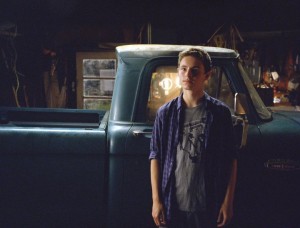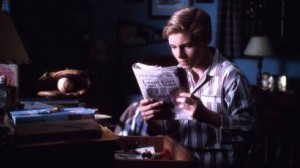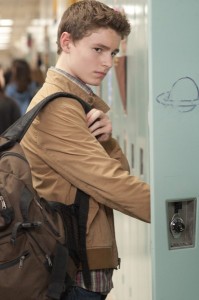 Callan McAuliffe is a young teen actor from Australia who just moved to America after appearing in Rob Reiner’s Flipper, and now in D.J. Caruso’s I Am Number Four. Barely (of this interview) sixteen, it’s always a little sketchy when you interview someone who’s a young performer, but McAuliffe came in the room and played well with a handful of journalists. Later, chatting with some who were in the room, he seems more focused, and better at this game than the film’s leading man. Or perhaps he hasn’t been worn down at all by the process, as he appeared chipper and amused to be talking with us.
Callan McAuliffe is a young teen actor from Australia who just moved to America after appearing in Rob Reiner’s Flipper, and now in D.J. Caruso’s I Am Number Four. Barely (of this interview) sixteen, it’s always a little sketchy when you interview someone who’s a young performer, but McAuliffe came in the room and played well with a handful of journalists. Later, chatting with some who were in the room, he seems more focused, and better at this game than the film’s leading man. Or perhaps he hasn’t been worn down at all by the process, as he appeared chipper and amused to be talking with us.
In I Am Number Four, McAuliffe plays Sam, the nerdish guy who makes friends with the new guy John (Alex Pettyfer), only to find out that John is an alien. It’s a good role for anyone because you get to be both sympathetic and comic relief, and McAuliffe does well with the part. And so we began.
How does it feel to be second fiddle to the superheroes?
Callan McAuliffe: It’s pretty fun, it’s great to be in it so I can get in the way as a third-wheel character.
What did you go through to get this part, and did you have to go through physical training?
My character is not as adept at fighting as some of the other characters. I didn’t have to do any stunt training or core strength training or anything like that, ’cause all I really had to do was run away from monsters.
But you did get to shoot a really big gun?
That was what I was looking forward to the entire shoot. And that alone. Yeah that was good.
Can you talk about the work you do between Australia and here?
I used to do a lot of that, but it’s twenty-eight hours of flying there and back, so that’s, that’s pretty draining. As of two months ago we’ve now moved here.
Were you aware of the book series before you were cast?
I was told that it was based on a book, but the book wasn’t released until about halfway through shooting. I did read it after we shot it and really enjoyed it.
How do you feel after having read the book and have you seen the final version of the film now?
I only saw it a couple of days ago. I was blown away.
How do you think the adaption went?
 They did a really good job. In terms of the characters and the story, they stayed very faithful. But there’s always going to be a few changes here and there in terms of adapting a book to a movie.
They did a really good job. In terms of the characters and the story, they stayed very faithful. But there’s always going to be a few changes here and there in terms of adapting a book to a movie.
How hard was it adapting the accent?
It’s funny, it’s an “English” accent. It was never too hard for me. A lot of Australian people seem to be able to do that because we were always making fun of Americans.
How so?
Shh.
Go for it.
No, don’t worry about it, I’m not going to. It’s not too hard. We get a lot of the movies, the music, and the TV shows and stuff. We have a lot of American media. And so we are so exposed to it, that I guess we can imitate it.
Did you do it on your own or did you have a vocal coach?
There was a vocal coach there who just helped with the little nuances. If I pronounce one word wrong or something, most of the time I did, I worked through it myself. And I tried it myself. But there was always someone there in case.
Was it something you thought of beforehand as an actor, were you thinking “I should have an American accent?”
I had one already, I guess most people in Australia can – they do make a point of imitating other countries. I was told it would be useful to have an American accent. So I definitely worked on it.
Do you do a Southern accent or northeastern accent too?
That would be insulting. I wouldn’t like people to say “can do an Indian accent or Scottish accent?” The only one I would really rely on and be paid for is the American one. I feel like I’d be making fun of someone if I did any of the others.
What do you look for when you’re looking at a script? Drama? Action? Diversifying?
Well I mean a role is a role for me and a role is getting paid. It’s not like I’ve got people handing me scripts all the time for me to decided while sitting at a table stroking a cat. I go in for auditions and try my best to learn the script by heart. And if I like the role, then I’ll be going, and if I get it then great, if I don’t, it doesn’t matter, I’ll go for the next one. But it’s not, I’m not a pompous ass, I’m not going around like “this sucks, I’m not doing that.” I’m into whatever is open.
Did you get involved with shooting the green screen in this film?
Yeah, that was interesting. It’s tough when you have to run away from a monster that’s not there. That can be pretty dodgy, but we got through it. There was always a reference, so they did have a big cardboard cutout of the monster that we could look at before doing a scene. We knew vaguely what the size was, what the shape was. And then we just have to look at like a green dot on the end of a stick and that would be our monster. So we did have to use our imagination a little bit, which can be tough, but we got through it.
Was this a tough audition process? Did you meet (Steven) Spielberg or Michael (Bay)?
No. For Flipped last year, I did about six callbacks, ’cause they didn’t seem to know what they were looking for, and I don’t think they wanted me in the beginning either, because I was Australian and that posed problems. With this I did a single five minute audition and I think originally my character was considerably smaller than it is now. I was surprised, I did one audition. I didn’t think it was going anywhere. We were about to fly back to Australia and they called us and said, “you have the role.” So then we flew to Pittsburgh.
How was Pittsburgh?
 I love Pittsburgh. The name doesn’t exactly imply beauty, but it was beautiful. It was clean, it was green, everyone was nice. There was plenty of stuff to do, contrary to popular belief. I had a great time.
I love Pittsburgh. The name doesn’t exactly imply beauty, but it was beautiful. It was clean, it was green, everyone was nice. There was plenty of stuff to do, contrary to popular belief. I had a great time.
What was the experience of working with D. J. Caruso after working with Rob Reiner?
They’re both phenomenal directors – I couldn’t have asked for the two directors for me to work with to be as amazing. D. J. is great, he makes this atmosphere on set, as soon as he calls action everyone will shut the hell up and do their job, and do it professionally. As soon as he calls cut, everyone will be having fun, everyone will be throwing things around and he definitely did that. He had that presence.
And in the movie your character is bullied, what do you think of it, have you ever had experience with it?
I was always in the middle ground in terms of the high school hierarchy. I was never bullied, but I was never really popular. But I get a little bit irritated when I see people getting bullied and it’s more I get more irritated the people being bullied, because they never stand up for themselves. And you can’t go to a teacher, ’cause that makes things worse. If someone starts a fight, you really have to finish it, in my opinion. I think you really need to stand up for yourself, that’s the main point there.
Does that kind of thing happen pretty much just in America, are people more mellow in Australia?
I can’t really compare. I’ve never been to school here in America. But in Australia it does happen quite a lot.
Did you know Alex (Pettyfer) before this?
No, I’d seen Storm Breaker but I didn’t know him personally.
What was that experience like?
 It was great, as soon as the table read, we immediately bonded. The British and the Australian senses of humor are very similar, and so it was great. He was fantastic.
It was great, as soon as the table read, we immediately bonded. The British and the Australian senses of humor are very similar, and so it was great. He was fantastic.
Did you hang out on set?
Off set there wasn’t really much time, everyone just slept because it was very strenuous work, very long hours. And in between filming on set, that’s when everyone would bond and that’s when everyone would have fun. When we left we’d go to sleep, ’cause we’d usually go back at about three in the morning.
How closely did you stick to the script as it was written, or did you ad lib?
D.J. definitely did give me quite a bit of leeway with the script, and I’d always come to him and I’d always say, “oh what about this, what about that?” And he’d tell me if it was good or it wasn’t. But the scripts are always changing on the set of a film. It’s easy to get used to and we did stick mainly to the script. But there’s always a few line changes here and there.
Is there anything that you got to insert?
I think originally I improvised the word shit, about two hundred times. Just when running away from something. Just in the background there’s like “shit, shit, shit, shit, shit!” And I think that made it in there. It might be dubbed down, you might not actually be able to hear it but it’s there, and that was written in the script from the table read, ’cause I did that at the table read and they seemed to like it, ’cause it really added that extra dimension of my character, you could really see him develop from the kid who gets bullied to the kid who said shit a lot. And it’s definitely in there. Yeah. And it was written in the script, it was legitimately there like so-
Being Australian posed some problems in the casting, were they looking for an American actor?
I think said they were looking in terms of this film. For Flipped it was quite different, ’cause I was still back and forth from Australia. I was rarely in America. And this one they were looking for eighteen and over, because of the restrictions that come with being a minor. If I could do the American accent, then it wasn’t a concern of where I was from or what I was doing ’cause I could do an American accent. But it was more in terms of restrictions with hours, which we got through. But of course it’s ’cause I still go to school, I have the tutoring on set. Which can really be a pain in the ass for everyone on the project. But we got through it.
How old were you when you shot this film?
When they filmed this I was fifteen last year. I’m sixteen in Australia as of today. And I’ll be sixteen in America tomorrow. Thank you.
Are you going to celebrate twice?
My celebration sort of involves sleeping, especially after a junket like this.
How do you adjust to moving here?
We’re doing pretty well – we only moved about two months ago I’m adjusting, we’re adjusting, it’s doing, we’re doing well.
Having worked with Rob Reiner and D. J. Caruso, what do you think are the greatest lessons you’ve learned?
Long hours. Very long hours. Very tiring lot, you have to put a lot of work in. Um, other than that I don’t really learn anything on the set.
What was your role on Cloud Street and what is that exactly?
Cloud Street is an iconic Australian novel and I’m not sure if it’ll get released here.But that was fantastic, it’s great to be able to go back to Australia, where people understand my humor and they have the same accent as me. My character’s name is Quick Lamb and he’s the younger version of the Quick Lamb in the six hour miniseries. So, the older Quick Lamb takes the last four hours and I’m in the first two hours, which is the prologue, it sets up the rest of the story.
Did you know the other Aussie on this film?
I didn’t know Teresa (Palmer) before. I knew who she was based on what she’d done but she was fantastic, it was great to have another Australian on this, definitely.
Do you have anything coming out right now?
There’s a few things lined up here and there and I can’t really talk about them, but we’ll see what happens. I’m going to be doing some auditions and we’re still settling in, doing a whole bunch of schoolwork.
I Am Number Four opens Friday.
SCWAG DISCLOSURE: A hat and a shirt.